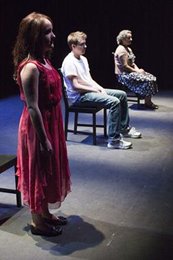It’s a bright, sunny morning in a busy market town in County Tyrone. As midday approaches, a young girl and her mother set out on a shopping trip for a special birthday present; a man sneaks his wife’s wicker basket into the back of his car and heads off to watch a GAA match in a local bar; two teenage brothers prepare to go out for a drive.
Ordinary people living ordinary lives on just another ordinary summer day. But the instant the town is identified as Omagh and the date as 15 August 1998, everything about this carefully crafted piece changes. Audience expectations and apprehensions become highly charged, even fearful, of what is about to unfold around a place and a date, which have become indelibly seared into the dark history of the Troubles.
The original script for Minute After Midday, Ross Dungan’s fictional memory play was nominated for the 2010 RTÉ PJ O'Connor Radio Play Award and one can understand the rationale. It is structured as a chorus of three personal testimonies, relying mainly on voice and narration. Out to Lunch Festival director Sean Kelly spotted it at the Edinburgh Festival in August, where it clocked up rave reviews and won a Scotsman Fringe First Award for innovation in new writing for 15th Oak Productions.
Dungan is an accomplished, sensitive young writer, who has here created vivid word pictures and dramatic scenes of human interaction. There are many cinematic flashes among the visual images: a terrified girl in a pink dress, caught up in the grey, tangled devastation of the aftermath of an explosion; the hand of an elderly man clutching a wicker basket, protruding from a heap of smoking rubble; a young lad standing on a hill watching his brother trying desperately to defuse the bomb attached to the undercarriage of their car.
 Under Dungan and Emily Reilly’s sensitive co-direction, the three accounts unfold, in sometimes unnecessarily minute detail, spoken by the three characters, who are seated side by side on straight-backed chairs. Slowly, a connecting thread emerges, in which each takes on a pivotal role in the tragedies of the other two. This is accomplished storytelling but its dramatic tension could be heightened and varied with some judicious editing and more imaginative use of staging and lighting.
Under Dungan and Emily Reilly’s sensitive co-direction, the three accounts unfold, in sometimes unnecessarily minute detail, spoken by the three characters, who are seated side by side on straight-backed chairs. Slowly, a connecting thread emerges, in which each takes on a pivotal role in the tragedies of the other two. This is accomplished storytelling but its dramatic tension could be heightened and varied with some judicious editing and more imaginative use of staging and lighting.
It is clear that the company takes very seriously its responsibility to the real-life victims of the Omagh atrocity. In a wise effort to avoid any hint of exploiting their grief, Dungan has chosen to create three imaginary characters, who movingly convey a horrible sense of fractured normality through experiences that are credible and well conceived.
Claire Hughes is the bright-faced Elizabeth Cosgrove, excited almost beyond words at the prospect of becoming the owner of a trendy denim jacket she has spied in a local outfitter’s window. Soon she will shrug off her childish pink dress and become another person. At times, her performance feels a little forced in its breathless innocence, but this is always a possibility when an actor is playing well below her age. As the audience watches and listens with baited breath, Elizabeth does, indeed, lose her childhood on that day, but in a manner, which she could never, in her worst nightmares, have imagined.
Dungan then confronts us with the other side of the story, lending a human face to the guilty party – and as nobody has yet been convicted in a criminal court for the Omagh bombing, this is a courageous stroke. Jude Greer tells Conor McKeating’s story with a cool, almost trance-like detachment. His motivation for being involved in terrorism has apparently stemmed from little more than periodic sectarian abuse by local loyalist hoods. Now he and his brother Danny find themselves tasked with a vital role in a major operation. Conor may have escaped prosecution, but we are left in no doubt that the memory of witnessing from afar his brother’s last-ditch rescue attempt has imprisoned him in a mental torment from which there will be no escape.
It is Eimear O'Riordan as Mari Jennings whose beautifully-judged performance hits home most powerfully. Sweet-faced and soft-voiced, she barely shifts in her chair as she recounts her long love affair with her husband Brian. He had not gone out to watch a match after all, but to buy her some treats for their wedding anniversary. And he would not be coming back. As Mari demonstrates the kind of Christian charity and forgiveness that were in evidence on countless occasions during the conflict, the piece leaves us with the message that hope can come out of despair and that it is the perpetrators who are doomed to endure forever the repercussions of their terrible deeds.
Jane Coyle is a Belfast-based freelance arts journalist and critic, who also contributes to The Irish Times, The Stage, Culture Northern Ireland and BBC Radio Ulster.